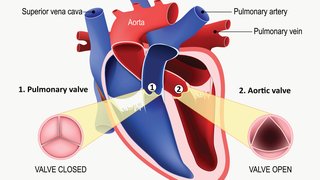
We’re cautioned every day to be aware of many devastating diseases. But among the most deadly is heart disease. Heart disease is the No. 1 killer of men and women in the United States. It also is among the least understood, least researched, and least discussed chronic diseases.
Heart disease is a blanket term for any disease that affects the heart. Included are hundreds of conditions, such as high blood pressure, heart attack, cardiomyopathy, enlarged valve disease, and arrhythmias.
Our goal is to educate people about what they can (and can’t) do to protect their hearts, and why heart disease prevention and care should be at the forefront of their health goals. Below are a few of the heart-health questions we often address with our patients year-round.
Why should I care about heart health?
I don’t think most people realize the serious impact heart disease has on our community, and on our country. Heart disease kills more than half a million people in the United States each year. In Texas alone, nearly 40,000 people died from heart disease in 2012. It’s time we wake up and recognize the risk factors for heart disease and take control of our health.
Obesity, Type 2 diabetes, and uncontrolled high blood pressure together have led to an enormous number of heart disease cases that could have been prevented with healthier lifestyle choices. But when these conditions are treated in isolation, rather than as part of a much larger constellation of conditions, we open the door to heart damage and lose precious years off our lives, and this can be prevented.
It’s also important to keep health risks in perspective. For example, when you look at an average woman’s relative risk for heart disease, it is far and away greater than her risk for other diseases. If you think in terms of relative risk, the risk of dying from heart disease is several times higher than the risk of dying from breast cancer. But there’s a lot more public awareness around breast cancer.
Don’t get me wrong; there’s no question that breast cancer research is very important. But the reality is that if you compare how much society invests in studying and curing a disease relative to the death rate of that disease, you’ll see a big disparity. The impact of heart disease is much greater than the amount of money devoted by society to understanding and controlling the problem.
That said, there has been a dramatic return on the investment that has been made in fighting heart disease. We’ve benefited from truly spectacular successes over the past 50 years. However, as new types of heart disease continue to emerge, we need to continue learning about prevention and researching effective treatment options.
How can I prevent heart disease?
About half of our heart disease risk is genetic – we’re born with specific genes, which we can’t control. This part of your risk can be managed with assistance from your physician. But the other half of our risk is modifiable, which means there are simple things we can do to decrease our risk.
All of us know, at some level, that these things are good for us: eating right, exercising, avoiding smoking, and managing our weight. Managing other risk factors, however, requires support from health care providers, who can measure our blood pressure, check our cholesterol level, or help us quit smoking.
Even if you feel fine right now, you may be a ticking time bomb for heart disease. There’s a commonly held myth that you can tell when your blood pressure is high – that’s simply untrue. Many people live with high blood pressure and are entirely unaware of it. It’s the same thing with cholesterol – you can’t tell when your cholesterol is elevated.
It’s important to regularly monitor your blood pressure, cholesterol, and weight. Being aware of these numbers should be a standard part of being engaged with your heart health.
I strongly encourage heart disease and heart failure patients to exercise. It’s profoundly good for your health on many levels. Many patients just nod their heads when I tell them this, but they don’t follow through with it. But for those patients who choose to accept the challenge, exercise has a significant, positive impact in terms of their heart health, their cardiovascular fitness, and their psychological health.
Heart disease patients often are faced with a “personal ownership” stigma in society. Sometimes, people assume, “You had a heart attack – you could have done a better job of taking care of yourself.” If you have heart disease, there’s this perception that you probably ate too much fast food and carried around 30 or 40 extra pounds. At some level, it’s your fault!
Of course, that’s not always true. There are many reasons people get heart disease – it’s not just about how you treat your body. As mentioned, half of your heart disease risk is out of your control. However, it is important for us to manage the risk factors that we can control.
Why is heart disease the No. 1 killer in the United States?
Probably the biggest factor why heart disease is the No. 1 killer in the U.S. is the dramatic deterioration in lifestyle in the past 25 years across the globe. The epidemic of obesity is shocking, and it’s changing the face of medicine in many ways.
Still, in the past 50 years we’ve seen amazing, dramatic successes in treating some forms of heart disease. For example, the risk of dying from cardiovascular disease has decreased 75 percent! That’s worth repeating: It means that the risk of a 65-year-old man dying of a heart attack in 1966 is 75 percent less likely to occur today.
That is a spectacular accomplishment, but now we are faced with a different issue. People who previously would have died from a heart attack (which still happens, though less often) are now surviving and yet are going home – alive – but with a damaged heart and at increased risk of developing heart failure. That is, they’re living with injured hearts.
Heart failure – when the heart is unable to pump blood well enough to keep the rest of the body happy and supplied with healthy, oxygenated blood – has exploded in prevalence. It has become a new form of heart disease. The effects of long-term high blood pressure, obesity, and other disorders eventually take a toll on the heart, even if a heart attack does not occur.
We’re a victim of our own success. People are living longer because they are surviving heart attacks or simply not having them in the first place, but they’re living with heart failure. Fortunately, heart failure sometimes can be managed.
Heart disease prevention is a major health concern, not only in Dallas-Fort Worth but also across the country. It’s vital that people learn to identify and manage heart disease risk factors, such as heart-healthy eating, regular exercise, and seeing a doctor to measure blood pressure, cholesterol, and weight.
Whereas for each of us, our risk of developing devastating heart disease is partly out of our control (approximately 50 percent is genetic) and partly within our control (50 percent is modifiable), the challenge before us is to do everything we can to minimize the risk and position ourselves for long and happy lives!
Stay on top of your heart health. Sign up for email alerts when new One Heart blogs are published.











